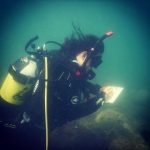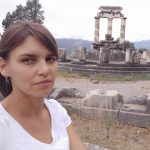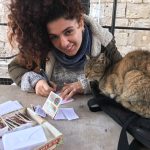Fellowships and Research Support
As part of its mission, KUDAR supports high-impact research on the relationship between society and the sea. In collaboration with the Research Center for Anatolian Civilizations (ANAMED), we offer residential fellowships for individuals who have received their Ph.D. In addition, stipends are available for qualified MA and Ph.D. students enrolled in the Department of Archaeology and History of Art at Koç University. Lastly, individuals with external support are welcome to use our resources as Visiting Scholars. For more information about these opportunities, application details, and our past fellows, please follow the links below.

Within the scope of his PhD research, Berslan will analyze Archaic, Classical, and Hellenistic amphorae from Pergamon and multiple settlements within its Micro-Region. His aim is to gain insights into the diachronic transformation of both inland and off-shore trade patterns and networks.



Ahmed received his first MA in History and Geography from the University of Sfax, and his second in Underwater Archaeology (2002), as well as his Ph.D., from the University of Aix-Marseilles (2010). He has participated in excavations in Italy, Malta, Egypt, Lebanon, and Türkiye. In 2012 he began working for the National Institute for Cultural Heritage in Tunisia, and became the Director of the museum and site of Carthage from 2015 to 2016. He continues to work in the National Institute within their Department of Underwater Archaeology, while also serving as an advisor to the Tunisian Ministry of Culture.
Alba Mazza is a maritime archaeologist, and holds a PhD in Archaeology from the University of Sydney (2017). Her research focuses on the relationship between people and the coastal environment. She is especially interested in understanding how people faced the challenges of living on the shore (such as floods, tsunamis, earthquakes and erosion), and become resilient. Given such an approach, her analysis of the coastal landscape of Mediterranean settlements spans from the Bronze Age to the Late Antiquity, and includes port infrastructures as well as landing spots on the beach. Her project at KUDAR-ANAMED “The maritime coastal landscape of Aiolian Cyme in Türkiye and Selinus in Sicily. Two sister port cities?” is a natural outgrowth from her PhD thesis, which dealt with the maritime coastal landscape of Selinus. In that initial study, it was possible to understand that Selinus shares several aspects of the maritime culture and the coastal environment with Aiolian Cyme in Türkiye. Hence, during her fellowship Dr. Mazza investigated port facilities, with a focus on Cyme’s topography, and material evidence from past underwater investigations. The study of those common maritime archaeological features can reveal us a great degree of archaeological and environmental information, and eventually inform us on respectively missing aspects of the maritime landscape of the two ancient cities. On a site-scale, this study improved our knowledge of Cyme, one of the most important coastal settlement of ancient Anatolia in the Greek, Roman and Late Roman period. More broadly this study, by comparing for the first time Cyme in Türkiye and Selinus in Sicily, offered new keys for understating important topics in today’s maritime archaeology, such as coastal landscape changes, topographical identity of places, connectivity by sea, and cultural interactions.
Athena Trakadas is a maritime archaeologist focusing on the Greco-Roman and early Islamic worlds – from the Atlantic facade to the Mediterranean to the Indian Ocean. Her primary research interests extend beyond ships to the economic, social, and environmental mechanisms that supported and facilitated their use. This includes the development of harbours within contemporary trade and communication networks, coastal and riverine geo-morphological changes affecting these marine-land interfaces, and the exploitation of marine resources. She is also a co-editor of the Journal of Maritime Archaeology.
Since 1999, she has directed several underwater and terrestrial research projects in Morocco that focus on past fishing practices, the logistical integration of landing places, and the development of maritime heritage management. Her KUDAR-ANAMED research project focuses on establishing the chronologies of, and factors for, the movement of settlements and their associated natural harbors along the lower Atlantic river valleys of northwest Morocco, from the 8th century BC to the 15th century AD. The project will correlate marine geological and archaeological data, as well as archival sources, to examine the complex inter-relationships in the diachronic establishment of harbour locations within dynamic river-scapes. The results of her project as a KUDAR-ANAMED Fellow have been published in the Journal of Island and Coastal Archaeology.
Nergis Günsenin graduated from Istanbul University with an undergraduate degree in Classical Archaeology, obtained her M.A. and Ph.D. degrees from University Paris I Panthéon-Sorbonne in Byzantine History and Archaeology (under Hélene Ahrweiler and Jean-Pierre Sodini) and in Nautical Archaeology (under Eric Rieth). Her Ph.D. dissertation, Byzantine Amphoras (Xth – XIIIth centuries): Typology, Production, and Circulation based on Turkish Collections is recognized internationally, and an eastern-Mediterranean amphora type from this period is named after her.
Prof. Günsenin has been lecturing on underwater archaeology at Istanbul University in the Underwater Technology Programme since 1991, and has also taught Anatolian Civilizations at Boğaziçi University from 1994 to 1999. She is an Associate Researcher of French Anatolian Studies in Türkiye, Adjunct Professor of the Institute of Nautical Archaeology, and an Advisory Editor for The International Journal of Nautical Archaeology. She has also been an invited professor at several foreign universities.
She conducted the first Turkish underwater excavation at Camaltı Burnu, which is the topic of her research at ANAMED for the 2019-2020 term, providing opportunities for collaboration with KUDAR and training for students at the Bandırma Museum, presetly housing the excavation’s collection.
(Although awarded his position for the 2020-2021 period, Dr. Salay postponed his tenure in Istanbul to begin in the 2021 academic year)
Paul Salay received his PhD in Classics from the University of Southern California in 2018, and has been teaching at Colorado College, Butler University, and Coe College since that time. He has been the James Rignall Wheeler Fellow at the American School of Classical Studies in Athens, and has been awarded competitive grants and scholarships from the USC / Del Amo fund and the Wenner Gren Foundation.
While in residence in Istanbul as the KUDAR-ANAMED postdoctoral fellow, Dr. Salay pursued his research that analyzes the development of ancient Mediterranean naval architecture from the Archaic to the Early Imperial eras within the context of the associated maritime transportation networks. He proposed that there is a correlation between different transportation networks and the dissemination of different shipbuilding technologies, as the networks represented conduits for the adoption and retention of these varying methods.
